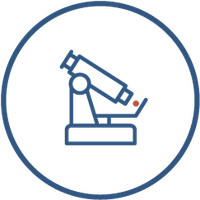Published: 11 October 2022
Ada Lovelace Day is an international day of celebration that aims to raise the profile of women in STEM to inspire others and create role models for young and old alike.
At BioAscent we have a diverse and experienced team from a range of different backgrounds. To mark Ada Lovelace Day 2022, we have asked a few of our female scientists to share what inspired them to pursue a career in science, and why they think it is important to celebrate women in science.
Kate Fell, Scientist in Chemistry
“From a young age I have always been curious about how things worked and loved problem solving. When I got to high school I had enthusiastic chemistry and biology teachers which made me look forward to those lessons. I enjoyed the experimental side of things - it was fun and didn’t really feel like learning. I was also really interested in the CSI TV programme - I was fascinated by the way science (like DNA and blood spatter analysis) could be used as evidence to convict criminals. This really inspired me to pursue a career in science, and so I went on to do a degree in forensics, before pursuing a masters and PhD.
“I think it’s extremely important to celebrate women in science. Science is historically a male dominated field, though this is beginning to change. By highlighting the numerous intelligent, curious, and creative female scientists and their achievements, we can inspire the next generation to pursue their own career in science.”
Samantha Martin, Scientist in Compound Management:
“I was originally only interested in Chemistry at school. My first exposure to Biology was when I attended college to study life sciences, and I had a very inspiring and enthusiastic Biology lecturer. This is where my love of Biology began!
“Women and girls represent half of the world’s population but only around 30% of our STEM workforce. It is important to inspire the next generation of women and girls to close this gap further by highlighting and celebrating the achievements and contributions of the women working in these fields.”
Tanya Mathie, Scientist in Chemistry:
“I was inspired to pursue a career in science because I love to understand how things work. Chemisty, in particular allowed me to use that understanding and combine it with the creativity of making small molecules.
“It is important that women feel they can have the same opportunities as men and that excellence in your field is recognised, regardless of gender. Women of Ada’s time should especially be celebrated as their disregard of society’s norm to pursue their passions has paved the way for women in science today.”
Cheryl Pattie, Scientist in Biosciences:
“I hadn’t thought about science much until I took Biology as a Higher in 5th year and my Biology teacher was amazing. She really made me love the subject and due to this, I decided I wanted a career in science.
“It’s important to show young women, just as my Biology teacher did with me, that science is a great industry for us to have a career. Due to her, I applied to study Microbiology and now I am in a career which is great, and I am also surrounded by other great women.”
Gina Hanlon, Senior Scientist, Shipping and Logistics Manager in Compound Management:
“At school I was always interested in science, especially biology. I loved experimenting and thrived on the anticipation of the results. I was most interested in working in healthcare and started training to be a nurse. I made the transition to medical research drawn by the possibility to help people on a greater scale through advances in medicine. I have been privileged to contribute to drug development projects that have improved the quality of life for people all over the world.
“Women have made significant gains across the sciences since I started my career in 1975 but still only represent a third of research scientists, according to most estimates. We need to celebrate those gains, and those women who make massive contributions in their fields, to inspire others.”
Alison Porter, Senior Scientist in Biosciences:
“I was inspired by my curiosity about the human body, disease and how the body responds. I liked the challenge of finding new medicines to help in the treatment of these diseases and conditions that so many people need to deal with and was eager to solve problems and to work in teams with other scientists to generate nice informative data is always a positive aspect of the job.
“It is a known fact that there are less women in science compared to men generally, however in my own field there tends to be more females, so I don’t notice the imbalance as much. I think gender equality is improving but in the past, many successful women have been overlooked whereas male scientists tend be given far more recognition and praise for their successes."
"Also, I find that women can be criticised by both men and women when they are more self-assured and confident. These traits are seen as more positive when shown by a man. Women also can be very successful while having children with lengthy maternity breaks. This can be disruptive to a woman’s career making it harder to be taken seriously and therefore climb the career ladder.”
BioAscent is a dynamic integrated drug discovery and compound management CRO. We offer inspiring career opportunities to those looking to develop their career in a fast-paced and inspiring environment. To find out more about working at BioAscent, click here.




